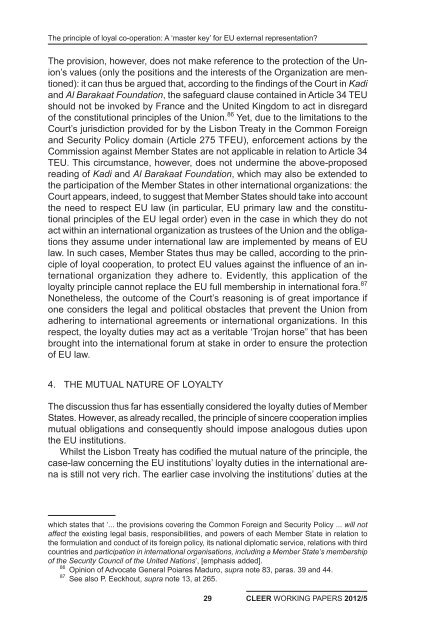CLEER WORKING PAPERS 2012/5Casolariment UN law in conformity with ‘the very foundations’ <strong>of</strong> the <strong>EU</strong> legal order. 81It follows that, strictly speaking, the need to respect the fundamental values <strong>of</strong>the Union should also lead to interpret the principle <strong>of</strong> loyalty in the sense thatMember States cannot assume UN obligations that are inconsistent with theconstitutional principles <strong>of</strong> the Union. Such an interpretation should preventthe ‘s<strong>and</strong>wich effect’ highlighted by Eckes. 82 After the Kadi <strong>and</strong> Al BarakaatFoundation ruling, indeed, the <strong>EU</strong> Member States have been placed before anawkward choice: either the Member States ensure the implementation <strong>of</strong> UNsanctions, <strong>and</strong> thus may be brought before the ECJ for failure to comply with<strong>EU</strong> law; or they ensure the respect <strong>of</strong> <strong>EU</strong> law, with all the concomitant consequencesin terms <strong>of</strong> international responsibility vis-à-vis the UN legal order.The reading <strong>of</strong> the cases which is proposed here exactly corresponds to theposition expressed by Advocate General Maduro in his Opinions. According toAG Maduro, ‘[t]hat duty [i.e. the duty <strong>of</strong> loyalty] requires Member States toexercise their powers <strong>and</strong> responsibilities in an international organisation suchas the United Nations in a manner that is compatible with the conditions set bythe primary rules <strong>and</strong> the general principles <strong>of</strong> Community law. As Members <strong>of</strong>the United Nations, the Member States ... have to act in such a way as toprevent, as far as possible, the adoption <strong>of</strong> decisions by organs <strong>of</strong> the UnitedNations that are liable to enter into conflict with the core principles <strong>of</strong> the Communitylegal order. The Member States themselves, therefore, carry a responsibilityto minimise the risk <strong>of</strong> conflicts between the Community legal order <strong>and</strong>international law’. 83It is evident that such a reading <strong>of</strong> the position taken by the Court in Kadi<strong>and</strong> Al Barakaat Foundation may deeply influence the <strong>EU</strong> <strong>representation</strong> in theUN. As is well-known, this issue is only partially faced by <strong>EU</strong> primary law. Inparticular, for present purposes the wording <strong>of</strong> Article 34(2) T<strong>EU</strong> should berecalled, which reads: ‘Member States which are also members <strong>of</strong> the UnitedNations Security Council will concert <strong>and</strong> keep the other Member States <strong>and</strong>the High Representative fully informed. Member States which are members <strong>of</strong>the Security Council will, in the execution <strong>of</strong> their functions, defend the positions<strong>and</strong> the interests <strong>of</strong> the Union, without prejudice to their responsibilities underthe provisions <strong>of</strong> the United Nations Charter’. 84 According to several scholars,the last passage <strong>of</strong> the second sentence <strong>of</strong> that paragraph (‘without prejudiceto their responsibilities under the provisions <strong>of</strong> the United Nations Charter’)makes express reference to the right to veto <strong>of</strong> the <strong>EU</strong> Member States whichare permanent Security Council members <strong>and</strong>, consequently, allows them notto act on behalf <strong>of</strong> the Union in participating in Security Council’s activities. 8581 N. Lavranos, ‘The Impact <strong>of</strong> the Kadi Judgment on the International Obligations <strong>of</strong> the ECMember States <strong>and</strong> the EC’, 28 Yearbook <strong>of</strong> European Law (2009) 616, at 619.82 C. Eckes, ‘<strong>EU</strong> Counter-Terrorist Sanctions against Individuals: Problems <strong>and</strong> Perils’, 17European Foreign Affairs Review (2012) 113, at 130.83 Opinion <strong>of</strong> Advocate General Poiares Maduro, 23 January 2008, para. 32.84 [Emphasis added].85 See for instance N. Ronzitti,‘Il seggio europeo alle Nazioni Unite’, 91 Rivista di diritto internazionale(2008) 79, at 91. In this sense see also the Declaration No 14 annexed to the Final Act<strong>of</strong> the Lisbon Intergovernmental Conference concerning the common foreign <strong>and</strong> security policy,28
The principle <strong>of</strong> loyal co-operation: A ‘master key’ for <strong>EU</strong> <strong>external</strong> <strong>representation</strong>?The provision, however, does not make reference to the protection <strong>of</strong> the Union’svalues (only the positions <strong>and</strong> the interests <strong>of</strong> the Organization are mentioned):it can thus be argued that, according to the findings <strong>of</strong> the Court in Kadi<strong>and</strong> Al Barakaat Foundation, the safeguard clause contained in Article 34 T<strong>EU</strong>should not be invoked by France <strong>and</strong> the United Kingdom to act in disregard<strong>of</strong> the constitutional principles <strong>of</strong> the Union. 86 Yet, due to the limitations to theCourt’s jurisdiction provided for by the Lisbon Treaty in the Common Foreign<strong>and</strong> Security Policy domain (Article 275 TF<strong>EU</strong>), enforcement actions by theCommission against Member States are not applicable in relation to Article 34T<strong>EU</strong>. This circumstance, however, does not undermine the above-proposedreading <strong>of</strong> Kadi <strong>and</strong> Al Barakaat Foundation, which may also be extended tothe participation <strong>of</strong> the Member States in other international organizations: theCourt appears, indeed, to suggest that Member States should take into accountthe need to respect <strong>EU</strong> law (in particular, <strong>EU</strong> primary law <strong>and</strong> the constitutionalprinciples <strong>of</strong> the <strong>EU</strong> legal order) even in the case in which they do notact within an international organization as trustees <strong>of</strong> the Union <strong>and</strong> the obligationsthey assume under international law are implemented by means <strong>of</strong> <strong>EU</strong>law. In such cases, Member States thus may be called, according to the principle<strong>of</strong> loyal cooperation, to protect <strong>EU</strong> values against the influence <strong>of</strong> an internationalorganization they adhere to. Evidently, this application <strong>of</strong> theloyalty principle cannot replace the <strong>EU</strong> full membership in international fora. 87Nonetheless, the outcome <strong>of</strong> the Court’s reasoning is <strong>of</strong> great importance ifone considers the legal <strong>and</strong> political obstacles that prevent the Union fromadhering to international agreements or international organizations. In thisrespect, the loyalty duties may act as a veritable ‘Trojan horse” that has beenbrought into the international forum at stake in order to ensure the protection<strong>of</strong> <strong>EU</strong> law.4. The mutual nature <strong>of</strong> loyaltyThe discussion thus far has essentially considered the loyalty duties <strong>of</strong> MemberStates. However, as already recalled, the principle <strong>of</strong> sincere cooperation impliesmutual obligations <strong>and</strong> consequently should impose analogous duties uponthe <strong>EU</strong> institutions.Whilst the Lisbon Treaty has codified the mutual nature <strong>of</strong> the principle, thecase-law concerning the <strong>EU</strong> institutions’ loyalty duties in the international arenais still not very rich. The earlier case involving the institutions’ duties at thewhich states that ‘... the provisions covering the Common Foreign <strong>and</strong> Security Policy ... will notaffect the existing legal basis, responsibilities, <strong>and</strong> powers <strong>of</strong> each Member State in relation tothe formulation <strong>and</strong> conduct <strong>of</strong> its foreign policy, its national diplomatic service, relations with thirdcountries <strong>and</strong> participation in international organisations, including a Member State’s membership<strong>of</strong> the Security Council <strong>of</strong> the United Nations’, [emphasis added].86 Opinion <strong>of</strong> Advocate General Poiares Maduro, supra note 83, paras. 39 <strong>and</strong> 44.87 See also P. Eeckhout, supra note 13, at 265.29CLEER WORKING PAPERS 2012/5
- Page 1: Founded in 2008, the Centre for the
- Page 4 and 5: CLEER WORKING PAPERS 2012/5Gosalbo
- Page 6 and 7: CLEER WORKING PAPERS 2012/5Gosalbo
- Page 8 and 9: CLEER WORKING PAPERS 2012/5Gosalbo
- Page 10 and 11: CLEER WORKING PAPERS 2012/5Blockman
- Page 12 and 13: CLEER WORKING PAPERS 2012/5Blockman
- Page 14 and 15: CLEER WORKING PAPERS 2012/5Casolari
- Page 16 and 17: CLEER WORKING PAPERS 2012/5Casolari
- Page 18 and 19: CLEER WORKING PAPERS 2012/5Casolari
- Page 20 and 21: CLEER WORKING PAPERS 2012/5Casolari
- Page 22 and 23: CLEER WORKING PAPERS 2012/5Casolari
- Page 24 and 25: CLEER WORKING PAPERS 2012/5Casolari
- Page 26 and 27: CLEER WORKING PAPERS 2012/5Casolari
- Page 28 and 29: CLEER WORKING PAPERS 2012/5Casolari
- Page 32 and 33: CLEER WORKING PAPERS 2012/5Casolari
- Page 34 and 35: CLEER WORKING PAPERS 2012/5Casolari
- Page 36 and 37: CLEER WORKING PAPERS 2012/5Casolari
- Page 38 and 39: CLEER WORKING PAPERS 2012/5Casolari
- Page 40 and 41: CLEER WORKING PAPERS 2012/5Van Elsu
- Page 42 and 43: CLEER WORKING PAPERS 2012/5Van Elsu
- Page 44 and 45: CLEER WORKING PAPERS 2012/5Van Elsu
- Page 46 and 47: CLEER WORKING PAPERS 2012/5Van Elsu
- Page 48 and 49: CLEER WORKING PAPERS 2012/5Van Elsu
- Page 50 and 51: CLEER WORKING PAPERS 2012/5Van Elsu
- Page 52 and 53: CLEER WORKING PAPERS 2012/5Van Elsu
- Page 54 and 55: CLEER WORKING PAPERS 2012/5Van Elsu
- Page 56 and 57: CLEER WORKING PAPERS 2012/5Van Elsu
- Page 58 and 59: CLEER WORKING PAPERS 2012/5Van Elsu
- Page 60 and 61: CLEER WORKING PAPERS 2012/5Van Elsu
- Page 62 and 63: CLEER WORKING PAPERS 2012/5Van Voor
- Page 64 and 65: CLEER WORKING PAPERS 2012/5Van Voor
- Page 66 and 67: CLEER WORKING PAPERS 2012/5Van Voor
- Page 68 and 69: CLEER WORKING PAPERS 2012/5Van Voor
- Page 70 and 71: CLEER WORKING PAPERS 2012/5Van Voor
- Page 72 and 73: CLEER WORKING PAPERS 2012/5Van Voor
- Page 74 and 75: CLEER WORKING PAPERS 2012/5Van Voor
- Page 76 and 77: CLEER WORKING PAPERS 2012/5Van Voor
- Page 78 and 79: CLEER WORKING PAPERS 2012/5Van Voor
- Page 80 and 81:
CLEER WORKING PAPERS 2012/5Van Voor
- Page 82 and 83:
CLEER WORKING PAPERS 2012/5Van Voor
- Page 84 and 85:
CLEER WORKING PAPERS 2012/5Van Voor
- Page 86 and 87:
CLEER WORKING PAPERS 2012/5McArdle
- Page 88 and 89:
CLEER WORKING PAPERS 2012/5McArdle
- Page 90 and 91:
CLEER WORKING PAPERS 2012/5McArdle
- Page 92 and 93:
CLEER WORKING PAPERS 2012/5McArdle
- Page 94 and 95:
CLEER WORKING PAPERS 2012/5McArdle
- Page 96 and 97:
CLEER WORKING PAPERS 2012/5McArdle
- Page 98 and 99:
CLEER WORKING PAPERS 2012/5McArdle
- Page 100 and 101:
CLEER WORKING PAPERS 2012/5McArdle
- Page 102 and 103:
CLEER WORKING PAPERS 2012/5McArdle
- Page 104 and 105:
CLEER WORKING PAPERS 2012/5McArdle
- Page 106 and 107:
CLEER WORKING PAPERS 2012/5Eckeswit
- Page 108 and 109:
CLEER WORKING PAPERS 2012/5Eckesdro
- Page 110 and 111:
CLEER WORKING PAPERS 2012/5Eckesto
- Page 112 and 113:
CLEER WORKING PAPERS 2012/5Eckesare
- Page 114 and 115:
CLEER WORKING PAPERS 2012/5EckesEU
- Page 116 and 117:
CLEER WORKING PAPERS 2012/5Eckeswil
- Page 118 and 119:
CLEER WORKING PAPERS 2012/5EckesPar
- Page 120 and 121:
CLEER WORKING PAPERS 2012/5Eckesthe
- Page 122 and 123:
CLEER WORKING PAPERS 2012/5Eckesise
- Page 124 and 125:
CLEER WORKING PAPERS 2012/5Eckesand
- Page 126 and 127:
CLEER WORKING PAPERS 2012/5Eckesto
- Page 128 and 129:
CLEER WORKING PAPERS 2012/5Eckesarg
- Page 130 and 131:
CLEER WORKING PAPERS 2012/5Wouters,
- Page 132 and 133:
CLEER WORKING PAPERS 2012/5Wouters,
- Page 134 and 135:
CLEER WORKING PAPERS 2012/5Wouters,
- Page 136 and 137:
CLEER WORKING PAPERS 2012/5Wouters,
- Page 138 and 139:
CLEER WORKING PAPERS 2012/5Wouters,
- Page 140 and 141:
CLEER WORKING PAPERS 2012/5Wouters,
- Page 142 and 143:
CLEER WORKING PAPERS 2012/5Wouters,
- Page 144 and 145:
CLEER WORKING PAPERS 2012/5Wouters,
- Page 146:
CLEER WORKING PAPERS 2012/5Wouters,








